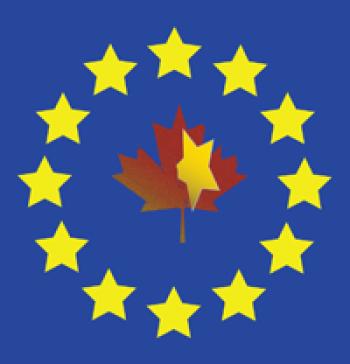According to a short news piece by Canadian Press, “Canada is struggling to maintain the traditional standards it imposes to protect financial services in Canada from foreign control and financial instability.” CP obtained a February 1 version of the services chapter of the Comprehensive Economic and Trade Agreement, which was circulated to EU member states, showing that “Canada’s vaunted banking system is on the negotiating table.”
A separate article in the Wall Street Journal elaborates on the news, saying “Canadian negotiators are pushing for the financial sector to be broadly exempted from commitments in a trade pact they are hammering out with the European Union,” and that this is “one of the key sticking points in the talks, according to people familiar with the matter.” How to handle financial regulations is “among half a dozen outstanding issues that negotiators on both sides are grappling with in Brussels this week,” says WSJ.
For example, Canada is looking for a “prudential carve-out” for its many financial stability rules designed to buffer the Canadian economy from the kinds of extreme shocks the world saw after the last global banking crisis. “Specifically,” says the WSJ article, “the exemption would bar private investors or financial institutions from being able to take the Canadian government to arbitration or seek other legal remedies from the government related to alleged violations of trade obligations.”
Any disputes a European bank, insurance or other financial firm had with Canadian regulations would have to go through CETA’s state-to-state dispute settlement process. These firms would not be able to directly sue Canada through a planned NAFTA-like investor-state dispute settlement process in CETA. Belgium was recently hit with a $2.28-billion USD investment claim related to prudential financial measures after the crisis under a bilateral investment treaty with China. Presumably Canada wants to avoid this kind of thing under CETA.
It won’t just be European firms suing Canada. As trade lawyer Steven Shrybman wrote in an opinion for the Canadian Union of Public Employees on Canada’s services offer to the EU:
In terms of tri-lateral trade relations with the US and Mexico, CETA may be seen as a form of unilateral disarmament. This is because under NAFTA, and with few exceptions, Canada is obliged to provide Most-Favoured-Nation (MFN) treatment to US and Mexican investors and service providers. With CETA, Canada is proposing to accord EU investors and services providers far more expansive rights than those accorded their US and Mexican counterparts. Canada would therefore be required to provide this ‘mostfavoured’ treatment to its NAFTA partners, even though neither is making reciprocal commitments.
So not only European but also U.S. and Mexican financial firms would be able to pick apart Canada’s prudential financial regulations if CETA is signed and ratified, which raises the risk level for all of us. Hypocritically, Canada is also among those developed nations pushing more financial sector deregulation through the WTO (GATS and a new International Service Agreement project) and bilateral investment treaties with developing countries.
“Canada’s stringent banking regulations served it well during the crisis,” writes Ellen Gould in a recent report for the Canadian Centre for Policy Alternatives. “However, proposed GATS (General Agreement on Trade in Servivces) disciplines will create pressures to weaken regulations in all sectors including financial services… Developing countries skeptical of full liberalization of financial services could point to the Canadian experience as evidence that protecting national banks from foreign take-over and competition can lessen their vulnerability to contagion from global financial crises.”
The WSJ quotes a spokesperson for International Trade Minister Ed Fast saying “the strength of Canada’s financial institutions throughout the most recent global economic crisis reflects the strength and soundness of Canada’s regulatory framework.” It’s an almost meaningless statement considering the CETA negotiations will put new restraints on the kinds of financial regulations Canada will be able to apply to banks, etc in the future.
Fast’s spokesperson adds that Canada and the EU “have made progress in several of the areas that remain outstanding” but “further important work remains to be done,” and that both sides “share the desire to conclude these negotiations as soon as possible.”
To send a note to Prime Minister Harper asking him to walk away from the CETA negotiations, click here now. The possibility that CETA could undermine Canada’s world-famous banking and financial safeguards is just one more reason among dozens to say no to this deal.



